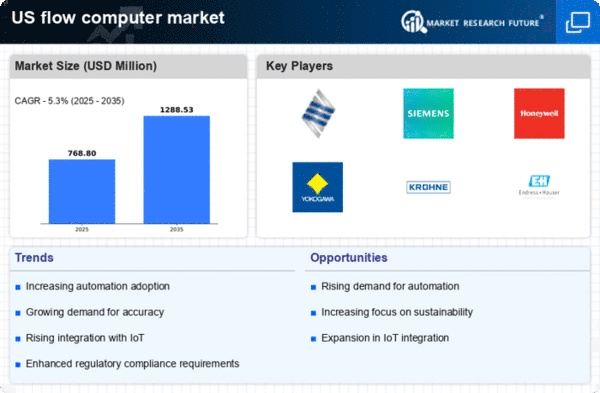Growing Focus on Energy Efficiency
The The flow computer market is increasingly influenced by a growing emphasis on energy efficiency and sustainability. Organizations are actively seeking solutions that not only enhance operational efficiency but also reduce energy consumption and environmental impact. Flow computers play a crucial role in monitoring and optimizing energy usage across various applications, including industrial processes and utility management. As companies strive to meet sustainability goals, the demand for flow measurement solutions that support energy efficiency initiatives is likely to rise. This trend is expected to contribute to the growth of the flow computer market, with projections indicating a potential increase of around 6% in market size over the next few years as businesses prioritize sustainable practices.
Regulatory Compliance and Standards
The flow computer market is significantly influenced by stringent regulatory requirements and industry standards. In the United States, various sectors, including energy and water utilities, are mandated to adhere to specific measurement and reporting standards. This regulatory landscape compels organizations to invest in reliable flow measurement solutions to ensure compliance and avoid penalties. The market is expected to witness a surge in demand for flow computers that meet these regulatory standards, as companies prioritize compliance to maintain operational licenses. Furthermore, the increasing focus on environmental regulations may drive the adoption of flow computers that facilitate accurate emissions reporting, thereby enhancing the overall growth of the flow computer market.
Rising Demand for Accurate Measurement
The flow computer market is experiencing a notable increase in demand for precise measurement solutions across various industries. This trend is driven by the need for enhanced operational efficiency and compliance with regulatory standards. Industries such as oil and gas, water management, and chemical processing are particularly focused on accurate flow measurement to optimize their processes. According to recent data, the flow computer market is projected to grow at a CAGR of approximately 6.5% over the next five years, indicating a robust demand for advanced measurement technologies. As companies strive to minimize errors and improve data integrity, the adoption of sophisticated flow computers is likely to rise, further propelling the growth of the flow computer market.
Technological Advancements in Flow Measurement
Technological advancements are playing a pivotal role in shaping the flow computer market. Innovations such as the integration of IoT and AI technologies are enhancing the capabilities of flow computers, allowing for real-time data analysis and remote monitoring. These advancements enable industries to optimize their operations and reduce costs associated with manual monitoring. The market is witnessing a shift towards smart flow measurement solutions that offer improved accuracy and efficiency. As industries increasingly adopt these technologies, the flow computer market is likely to expand, with a projected growth rate of around 7% annually over the next few years. This trend indicates a strong inclination towards embracing cutting-edge technologies in flow measurement.
Increased Investment in Infrastructure Development
The flow computer market is benefiting from increased investments in infrastructure development across various sectors. In the United States, significant funding is being allocated to modernize aging infrastructure, particularly in the energy and water sectors. This investment is driving the demand for advanced flow measurement solutions to ensure efficient resource management and distribution. As new projects emerge, the need for reliable flow computers becomes paramount to monitor and control flow rates effectively. The The flow computer market is expected to see a substantial boost as infrastructure projects are initiated. This growth is anticipated at a rate of approximately 5.5% over the next few years, reflecting the positive impact of infrastructure investments.
.png)















